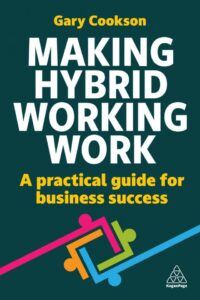Making hybrid working work
As companies like Amazon mandate a return to the office, the debate around working from home (WFH) rages on. While many organisations have embraced hybrid working, others are pulling back, demanding employees return full-time. According to KPMG’s 2024 CEO Outlook, 79% of CEOs expect the workforce to be working in the office within the next three years.
Despite this, research consistently shows that hybrid working and WFH offers significant benefits without harming productivity. For example, this research shows that working from home increases productivity by 12%, mainly due to a reduction in distractions. Interestingly, productivity gains more than double when managers decide who works on tasks at home or in the office.
Gary Cookson, author of the forthcoming book Making hybrid working work – A practical guide for business success, scheduled for release on 3 January 2025, sets out to make sense of how work should be done, exploring the nuances of WFH and hybrid models. His research shows that hybrid working improves retention without damaging performance. “My research, and lots of other research that points in the same direction, shows people want hybrid work and that there are significant benefits where you can give it to them in a way that works for them. At worst, it is neutral in terms of productivity… the worst that will happen is you’ll see no improvement, but equally, no deterioration,” he says.
A polarised debate
According to Cookson, the controversy surrounding WFH stems from deeply polarised views among business leaders and employees. While some workers thrive in a fully remote environment, others struggle. These divergent opinions are hampering an organisation’s ability to make well-informed decisions about how, where and when work should be done. “People have polarised views about WFH and these views are driving poor organisational decisions. … they’re not making the right decisions on all of the available evidence, and they’re also trying to apply a one-size-fits-all approach where no such thing is possible, let alone desirable.”
The bigger picture
Cookson’s book addresses broader questions about the structure of work itself. From the length of the working week to where and why work is done, he believes that hybrid working could reshape society. “Why does work have to be five days and 40 hours a week? Why does it have to be all on one site? If we really grasp remote and hybrid working, it changes what we use our city centres for.”
He explains that as people work more regionally, infrastructure needs will shift. City centres may see reduced demand, while regional areas could require better facilities. Cookson calls for deeper conversations around transport, housing, and the implications of these changes on daily life.
Measuring success
Cookson says that there is no universal way to measure the success of hybrid working but this isn’t a problem. He explains, “There isn’t one way of measuring the effectiveness of hybrid working, and I think that’s okay. For 1,000 years or more, we’ve never had a way of measuring the effectiveness of on-site work. So why do we think we have to measure hybrid work?”
In his research, Cookson found that different businesses measure success differently—whether through productivity, profit, or engagement. He encourages organisations to avoid benchmarking against others, advising them to craft their own approach.
Who should champion hybrid working?
The responsibility for making hybrid working successful, Cookson says, lies across the organisation. He believes that HR and Learning & Development (L&D) professionals have a key role but emphasises that other departments, such as technology and real estate, must be involved. “It is a complete redesign of an organisation. I don’t think there’s any person in an organisation who could say, ‘I’m not bothered by this’. This needs a holistic, joined up approach.”
The book aims to guide organisations through the complexities of hybrid working, offering research-backed insights and practical advice for business leaders. In a world where the future of work remains uncertain, Cookson believes that with the right decisions, the potential benefits of hybrid working are significant.
“If we can get this right, if we make all the right decisions in the right context with the right people, there are huge benefits to doing this. But even if it fails, the worst that will happen is nothing.”
- Making hybrid working work – A practical guide for business success can be pre-ordered now.

